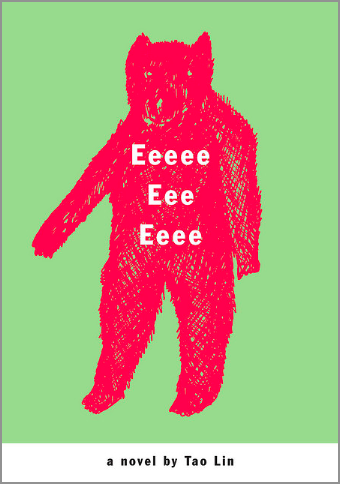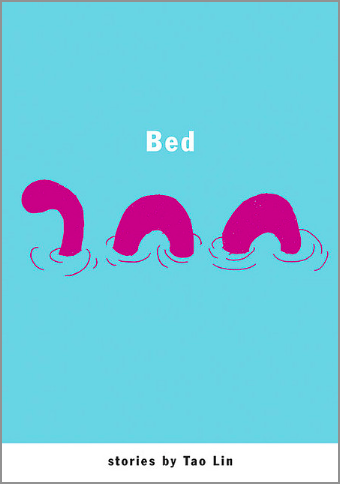from EEEEE EEE EEEE
Dolphins felt top-heavy, that year, most of the time, and wanted to lie down. When their heads weren’t on top they still felt top-heavy, but metaphysically. In public places they felt sad. They went into restrooms, hugged themselves, and quietly went, ‘Eeeee eee eeee.’ Weekends they went to playgrounds alone. They sat in the top of slides—the enclosed part, where it glowed a little because of the colored plastic—and felt very alert and awake but also very sad and immature. Sometimes they fell asleep and a boy’s mother would prod the dolphin with a broom and the dolphin would go down the slide while still asleep. At the bottom they would feel ashamed and go home and lie in bed. They felt so sad that they believed a little that it was their year to be sad, which made them feel better in a devastated, hollowed-out way. Life was too sad and it was beautiful to really feel it for once; to be allowed to feel it, for one year. When dolphins had these thoughts, usually on weekends at night, it was like dreaming, like a pink flower in a soft breeze on a field was lightly dreaming them. The sadness was like a pink forest that got less dense as you went in and then changed into a field, which the dolphins walked into alone. Sometimes the sadness was like a knife against the face. It made the dolphins cry and not want to move. But sometimes a young dolphin would feel very lonely and ugly and it was beautiful how alone it felt, and it would become restless with how perfect and elegant its sadness was and go away for a long time and then return and sit in its room and feel very alone and beautiful.
Sometimes when dolphins went to playgrounds alone they did the monkeybars and went to the swings and on the swings thought, “I hate this stupid world.”
They thought, “I hate it.”
They cried a little with the wind against their face.
They felt so bad that they went away.
And found Elijah Wood and told Elijah Wood to go with them and Elijah Wood went—because he thought it was a movie. Elijah Wood and other celebrities like Salman Rushdie rode dolphins in rivers. Salman Rushdie felt proud and famous. And the dolphins swam to islands and beat Elijah Wood and the other famous people with heavy branches. They cried when they murdered human beings, and it was terrible.
One dolphin had a battle axe and killed Wong Kar-Wai.
Wong Kar-Wai was easier because he wore sunglasses and couldn’t really see the terror.
Sometimes dolphins knew other dolphins—cousins, uncles—that had died, and they said, “It is sad they died but there is nothing to do except be nice to anyone still alive.” But they themselves had not been nice. They had killed Elijah Wood, Kate Braverman, and Philip Roth—people like that. They had made promises and forgotten. One dolphin had become friends with a man with Down syndrome and the man had written the dolphin a letter and the dolphin had not responded. Another dolphin had made promises to meet a person—had promised, and promised again, a third time—and had not kept them, and it had hurt the person.
And so they said, “I need to be nicer from now on,” and went home.
At home they decorated their Christmas trees and sat on the floor.
“I have no one to be nice to,” they thought.
They went to an acquaintance’s home—to try to be friendly and compassionate to someone—but were not invited inside, and went back home, and thought about how as a young dolphin they had thought that the Gulf War happened in the Gulf of Mexico.
Dolphins felt top-heavy, that year, most of the time, and wanted to lie down. When their heads weren’t on top they still felt top-heavy, but metaphysically. In public places they felt sad. They went into restrooms, hugged themselves, and quietly went, ‘Eeeee eee eeee.’ Weekends they went to playgrounds alone. They sat in the top of slides—the enclosed part, where it glowed a little because of the colored plastic—and felt very alert and awake but also very sad and immature. Sometimes they fell asleep and a boy’s mother would prod the dolphin with a broom and the dolphin would go down the slide while still asleep. At the bottom they would feel ashamed and go home and lie in bed. They felt so sad that they believed a little that it was their year to be sad, which made them feel better in a devastated, hollowed-out way. Life was too sad and it was beautiful to really feel it for once; to be allowed to feel it, for one year. When dolphins had these thoughts, usually on weekends at night, it was like dreaming, like a pink flower in a soft breeze on a field was lightly dreaming them. The sadness was like a pink forest that got less dense as you went in and then changed into a field, which the dolphins walked into alone. Sometimes the sadness was like a knife against the face. It made the dolphins cry and not want to move. But sometimes a young dolphin would feel very lonely and ugly and it was beautiful how alone it felt, and it would become restless with how perfect and elegant its sadness was and go away for a long time and then return and sit in its room and feel very alone and beautiful.
Sometimes when dolphins went to playgrounds alone they did the monkeybars and went to the swings and on the swings thought, “I hate this stupid world.”
They thought, “I hate it.”
They cried a little with the wind against their face.
They felt so bad that they went away.
And found Elijah Wood and told Elijah Wood to go with them and Elijah Wood went—because he thought it was a movie. Elijah Wood and other celebrities like Salman Rushdie rode dolphins in rivers. Salman Rushdie felt proud and famous. And the dolphins swam to islands and beat Elijah Wood and the other famous people with heavy branches. They cried when they murdered human beings, and it was terrible.
One dolphin had a battle axe and killed Wong Kar-Wai.
Wong Kar-Wai was easier because he wore sunglasses and couldn’t really see the terror.
Sometimes dolphins knew other dolphins—cousins, uncles—that had died, and they said, “It is sad they died but there is nothing to do except be nice to anyone still alive.” But they themselves had not been nice. They had killed Elijah Wood, Kate Braverman, and Philip Roth—people like that. They had made promises and forgotten. One dolphin had become friends with a man with Down syndrome and the man had written the dolphin a letter and the dolphin had not responded. Another dolphin had made promises to meet a person—had promised, and promised again, a third time—and had not kept them, and it had hurt the person.
And so they said, “I need to be nicer from now on,” and went home.
At home they decorated their Christmas trees and sat on the floor.
“I have no one to be nice to,” they thought.
They went to an acquaintance’s home—to try to be friendly and compassionate to someone—but were not invited inside, and went back home, and thought about how as a young dolphin they had thought that the Gulf War happened in the Gulf of Mexico.

